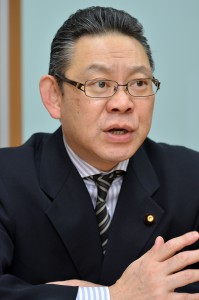Q. How do you evaluate the government and the ruling party’s revision of individual-household income compensation scheme as a part of agricultural reform?
A. Farmers are increasingly worried. People engaged in agricultural business nowadays have to make large amount of investments, and they set up repayment plans taking into account the government’s support measures. In spite of that, the government has decided to revise the so-called “bedrock policy” under the compensation scheme and halve the payment of JPY15,000 per 10 ares offered to rice farmers. The government plans to strengthen measures to facilitate production and sales of rice for livestock feed instead, but we don’t know whether the measures will be effective.
We know that considering the current circumstances, it is necessary to discuss revision of policies which compensate for the differences between production costs and sales value, such as the individual-household income compensation. But it seems the government and the ruling party made the revision pressured by economic circles which are calling for cost cuts and improvement of productivity. Farmers are concerned over government policies which change so often, and also over the direction the policies are heading for, which seems to favor only large-scale farmers.
The DPJ has already submitted a lawmaker-sponsored bill for individual-income compensation. In the current Diet session, we are going to have discussions to revise individual-household income compensation scheme to benefit the agricultural industry as a whole.
Q. How do you evaluate the negotiations under the Trans-Pacific Partnership free-trade talks?
The government seems too optimistic. There are many conflicts of interest between Japan and the United States, and perception gaps between the two governments are growing wider. On the other hand, we believe that the resolutions adopted by the agricultural committees of the upper and lower houses of the Diet are working out better than we had expected. We can say that the government is negotiating to protect the key agricultural products based on the resolutions.
However, now that the TPP member countries failed to reach agreement before the end of 2013 as scheduled, we have to admit that it has become difficult for them to conclude the talks. If the talks fail to produce convincing results for the Japanese people, the government will have to consider leaving the negotiating table, as the resolutions state that the government should be always ready to withdraw from negotiations.
Q. The government will set on revising the basic plan for food, agriculture and rural areas. How should the plan indicate the target for food self-sufficiency rate and the definition of farmers certified as ambitious?
A. We know that it is not easy to meet the target set by the DPJ when it was in power to raise the calorie-based self-sufficiency rate to 50 percent by fiscal 2020. But it is necessary to raise the sufficiency rate from the aspect of food security. I think we and the government share the same view. We hope to discuss this issue seriously in the Diet sessions.
We have no objections to the government and the ruling party’s aim of increasing incomes of certified farmers. Our intention is to expand the extent of communities subject to the government’s support measures and make the measures effective to maintain the population levels in rural communities. Supporting farmers’ efforts to enter processing and sales business is also a part of the measures.
It would not be possible to discuss the definition of certified farmers in detail unless the fundamental agricultural policy is clearly defined. It is necessary to clarify what the government and the ruling party are heading for, because they seem to have compiled the agricultural reform scheme under pressure from the Industrial Competitiveness Council.
Interviewed by Masayuki Tsuge
(Jan. 30, 2014)


